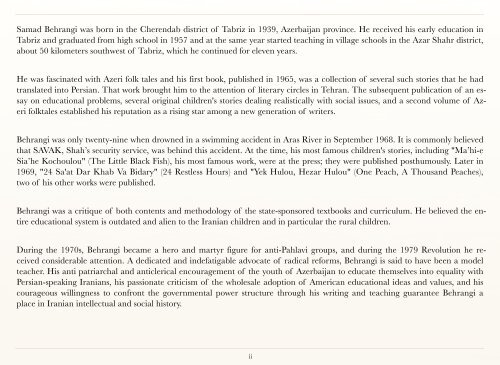The Little Sugar Beet Vendor & Talkhun
By Samad Behrangi
By Samad Behrangi
- No tags were found...
Create successful ePaper yourself
Turn your PDF publications into a flip-book with our unique Google optimized e-Paper software.
Samad Behrangi was born in the Cherendab district of Tabriz in 1939, Azerbaijan province. He received his early education in<br />
Tabriz and graduated from high school in 1957 and at the same year started teaching in village schools in the Azar Shahr district,<br />
about 50 kilometers southwest of Tabriz, which he continued for eleven years.<br />
He was fascinated with Azeri folk tales and his first book, published in 1965, was a collection of several such stories that he had<br />
translated into Persian. That work brought him to the attention of literary circles in Tehran. <strong>The</strong> subsequent publication of an essay<br />
on educational problems, several original children's stories dealing realistically with social issues, and a second volume of Azeri<br />
folktales established his reputation as a rising star among a new generation of writers.<br />
Behrangi was only twenty-nine when drowned in a swimming accident in Aras River in September 1968. It is commonly believed<br />
that SAVAK, Shah’s security service, was behind this accident. At the time, his most famous children's stories, including "Ma’hi-e<br />
Sia’he Kochoulou" (<strong>The</strong> <strong>Little</strong> Black Fish), his most famous work, were at the press; they were published posthumously. Later in<br />
1969, "24 Sa'at Dar Khab Va Bidary" (24 Restless Hours) and "Yek Hulou, Hezar Hulou" (One Peach, A Thousand Peaches),<br />
two of his other works were published.<br />
Behrangi was a critique of both contents and methodology of the state-sponsored textbooks and curriculum. He believed the entire<br />
educational system is outdated and alien to the Iranian children and in particular the rural children.<br />
During the 1970s, Behrangi became a hero and martyr figure for anti-Pahlavi groups, and during the 1979 Revolution he received<br />
considerable attention. A dedicated and indefatigable advocate of radical reforms, Behrangi is said to have been a model<br />
teacher. His anti patriarchal and anticlerical encouragement of the youth of Azerbaijan to educate themselves into equality with<br />
Persian-speaking Iranians, his passionate criticism of the wholesale adoption of American educational ideas and values, and his<br />
courageous willingness to confront the governmental power structure through his writing and teaching guarantee Behrangi a<br />
place in Iranian intellectual and social history.<br />
ii


















